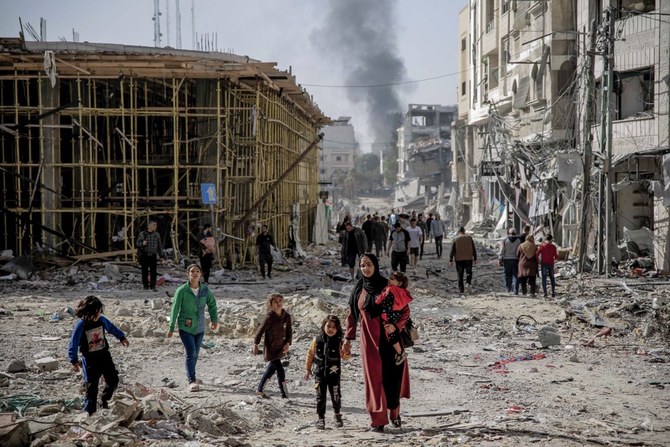LONDON: Just hours after US Secretary of State Antony Blinken urged Israel to prioritize civilians in its campaign against the Palestinian group Hamas, the Israeli military marked the end of a fragile truce in the Gaza Strip with renewed aerial bombardment.
By Saturday morning, 200 Palestinians had been killed, according to Hamas-run health ministry officials, as Israeli forces launched attacks on the Khan Younis area in southern Gaza, where it claimed to have targeted more than 50 Hamas sites.
The Israeli military said overall it hit more than 400 targets across the Gaza Strip, including strikes in the north, which suggested that no place in the besieged enclave was safe anymore.
Some 2 million people — almost Gaza’s entire population — poured into the territory’s south after Israel asked Palestinian civilians to relocate from other places at the military campaign’s start.
The question many were asking on Saturday was whether the Israel War Cabinet would heed the call of America’s top diplomat to have “a clear plan in place” for protecting civilians and avoid further mass displacement and damage to critical infrastructure, like hospitals, power stations and water facilities.
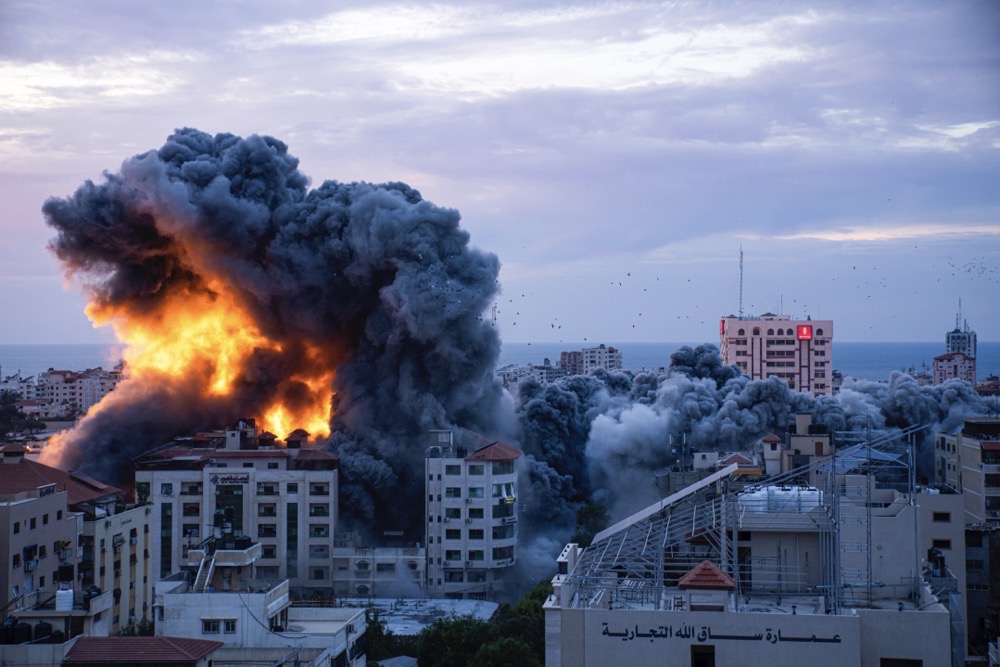
The Israeli military said overall it hit more than 400 targets across the Gaza Strip since the end of the truce. (AP/File)
Blinken’s comments, meant perhaps to shield the Biden administration from fresh criticism both at home and abroad, have left opinions divided among experts in war studies and geopolitics.
Tobias Borck, senior research fellow for Middle East security at RUSI, suspects that world leaders knew what was coming next after hearing those words, spoken to reporters in Jerusalem and Dubai.
“Blinken’s comments were made in anticipation of the truce coming to an end. This was the sense in Washington but also among the mediators, Egypt and Qatar,” he told Arab News.
“The option of a permanent ceasefire just did not seem viable to the Israeli government, which still felt it had a lot to do militarily. So, for Blinken the objective was to frame what came next, and was intended to show that the US was repositioning itself and making clear what its expectations were.”
Initially pegged as a four-day humanitarian pause to allow for the exchange of hostages by Hamas for Palestinians imprisoned by Israel, including many minors held in Israeli prisons without trial, the ceasefire lasted a week thanks to two extensions brokered by Qatar and Egypt.
After the end of the truce, militants in Gaza resumed firing rockets into Israel, and fighting also broke out between Israel and Hezbollah militants operating along its northern border with Lebanon, according to an Associated Press report.
With 110 of the 240 hostages taken by Hamas returned, the Israeli military announced officially that the truce was broken, saying it had intercepted rockets fired from Gaza a little after 6 a.m. on Friday morning.
The military subsequently dropped leaflets in densely populated parts of southern Gaza urging residents to leave, indicating an imminent widening of the offensive, and noting that Khan Younis was a “dangerous battle zone.”
As per reports, Blinken told Israeli Prime Minister Benjamin Netanyahu that were fighting to continue, Israel would need to find more effective measures for protecting civilians.
This meant acting in “compliance with international humanitarian law” and provision of “every possible measure to avoid civilian harm.” He also emphasized the need for “sustaining and building on humanitarian assistance getting to Gaza.”
While criticizing Hamas for a deadly attack in occupied Jerusalem on Thursday and the renewed rocket strikes, Blinken alluded to the leaflets and Israel’s publishing of an interactive map detailing safe sites for civilians to relocate to.
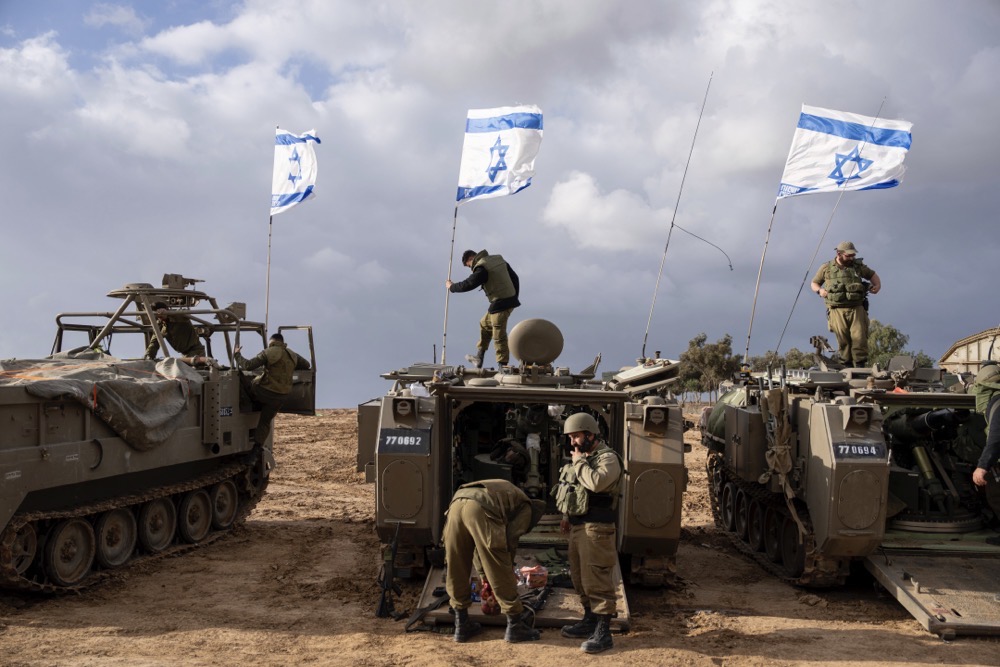
Israeli soldiers work on armored military vehicles along Israel's border with the Gaza Strip. (AP)
Released on social media and in Arabic, the Israeli military tweeted that the map “divides the territory of Gaza into zones according to recognizable areas. This enables the residents of Gaza to orient themselves and to evacuate from specific places for their safety if required.”
Sources linked to aid efforts in Gaza, however, rubbished the idea, one telling Arab News that aid blockages probably meant little fuel was available, leaving most people unable to charge devices to even see such a map.
Borck said a central problem when it came to the protection of civilians concerned merging of the political objective, “namely, destroying Hamas,” with the military objective, and in turn trying to ascertain whether there was a wider strategy beyond this.
“The purported aim, destroying Hamas, is a pretty maximalist one, both in the political sense and the military sense,” he said.
“But you must ask what it means by destroying Hamas. Does the killing of Mohammed Deif and Yahiya Sinwar, the two considered to have masterminded the Oct. 7 Hamas attacks, achieve the objective? If so, you need look only to the hunt for Al-Qaeda leader Osama bin Laden for a potential time scale.”
Oubai Shahbandar, a former Middle East defense adviser at the Pentagon, believes that in seeking to achieve its stated objective, Israel’s military will not be satisfied with simply “decapitating” the Hamas leadership hierarchy.
Rather, the intention is likely to ensure that Hamas’ capacity to put up any major asymmetrical military challenge is “totally degraded.” However, he said such a course of action was likely to play into Hamas’ hands.
“Sinwar probably had no illusions about the Israeli response to what happened on Oct. 7,” Shahbandar said.
“There aren’t any real signs that Netanyahu is going to seriously curtail the scope of airstrikes, artillery strikes and infantry assaults into southern Gaza to match the requests coming from the Biden White House.”
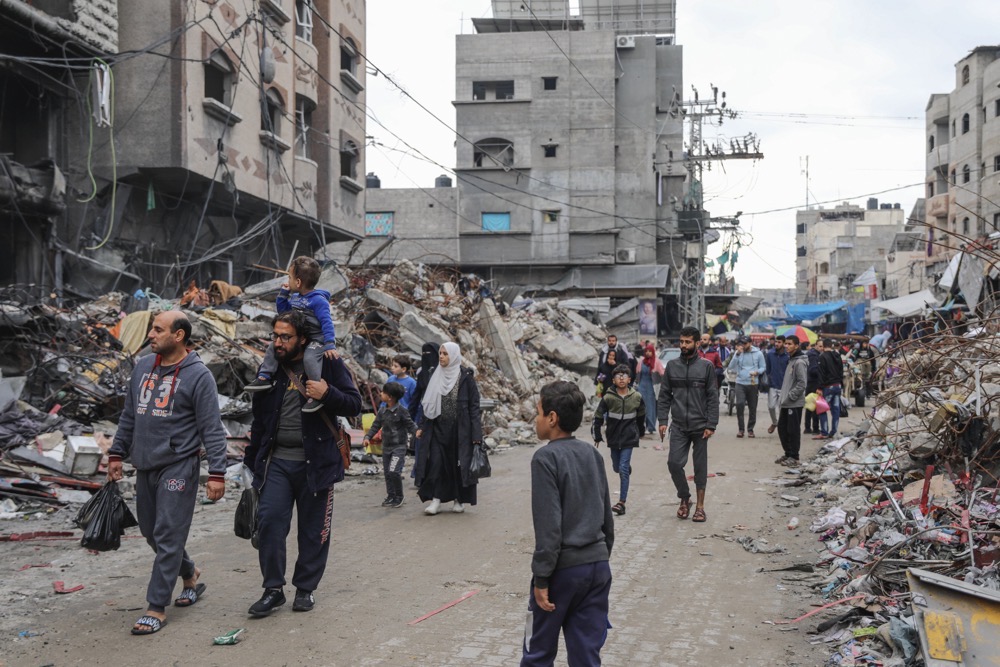
Some 2 million people — almost Gaza’s entire population — poured into the territory’s south. (AP)
President Biden himself warned in the wake of the Oct. 7 attack by Hamas it would be smart were Israel to learn from the mistakes the US had made in hunting the perpetrators of the 9/11 terrorist attacks.
That warning, though, had another meaning for Borck: the US, among numerous allies of Israel, was urging Netanyahu to think about “the day after Day 1,” specifically about where it wanted to be when the war ended, adding this was pivotal for Gaza’s civilian population.
Michael Pregent, a former US intelligence officer and senior fellow at the Hudson Institute, said Blinken’s demands were not a “serious ask” but reflected the opinion of a swathe of the international community.
He argues that there is a certain impossibility in minimizing civilian casualties, adding that Hamas is following a playbook he saw in Afghanistan, Iraq and Somalia, where groups with similar ideologies “invited civilian death” as it earned them capital in the international news media.
He also noted that in response to similar tactics adopted by Daesh in Iraq, the US itself ended up decimating more than 80 percent of the city of Mosul in its nine-month campaign to rout the militants beginning in October 2016.
INNUMBERS
• 170 People killed in Gaza since resumption of fighting.
• 14,800 People killed in Gaza since start of Israeli assault.
• 136 Hostages seized by Hamas on Oct. 7 still in Gaza.
Asked whether greater thought ought to be put into forging strategies in response to attacks like that of Oct. 7, and in general the threat posed by Hamas and its militant allies to both Israeli and Palestinian civilians alike, Pregent said one option was to exhort the people of Gaza to reject Hamas. But history showed that it did not work, he said.
“One need only look at Afghanistan, where the Taliban is back. Groups such as the Taliban and Hamas are familiar with the precedents. They tell civilians, ‘You support an uprising, but our opponents will eventually leave and we will still be here. And when they go, we will be back and we will kill you and your whole family.’”
Significantly, during his meeting with Netanyahu, Blinken said the US remained committed to supporting Israel’s right to self-defense and assured him that he could count on US support.
The Biden administration has rejected calls for a long-term ceasefire and backed Israel’s fight to remove Hamas from power in Gaza with no “red lines” as it were that would trigger US penalties.
Despite the US emphasis on protection of civilians, the Wall Street Journal reported that Washington had disclosed little about how many and what types of weapons it had sent to Israel during the Gaza conflict.
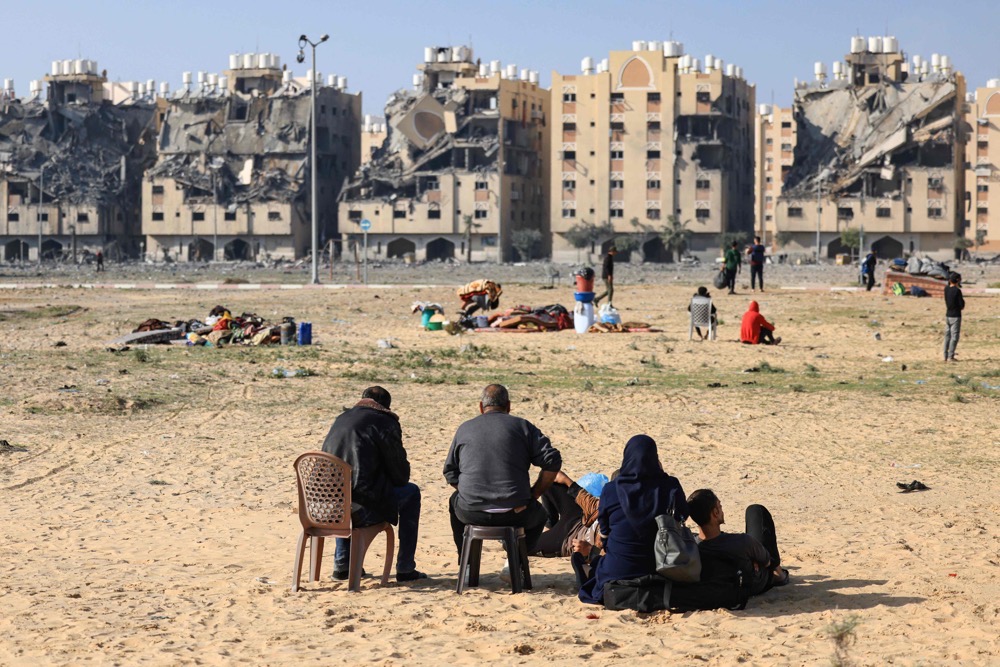
Residents of Hamad Town residential complex in Khan Yunis in the southern Gaza Strip, sit with some of their belongings as they flee their homes after an Israeli strike. (AFP)
“The arsenal of artillery, bombs and other weapons and military gear that have been used by the US in Iraq, Afghanistan, Somalia and Libya, among other places, usually target large groups of gathered enemy forces. In Gaza, by contrast, Israel is battling militants who are among civilians in dense urban environments,” the report said.
Against this backdrop, Shahbandar said history had repeatedly shown that Israel’s only realistic chance of dismantling Hamas as a military and political entity would not be found in the use of force.
“The way for Israel to achieve its aim is by helping to empower a Palestinian alternative to Hamas with real legitimacy,” he said. “But there seems very little appetite in the Netanyahu administration to pursue such a path.”
On Saturday, the International Rescue Committee, an aid group operating in Gaza, said the return of renewed fighting would “wipe out even the minimal relief” provided by the truce and “prove catastrophic for Palestinian civilians.”
Before the temporary truce took effect on Nov. 24, more than 13,300 Palestinians had been killed in Israel’s assault, roughly two-thirds of them women and minors, according to Gaza health officials.
The renewal of hostilities has also heightened concerns for the 136 Israelis and foreigners who are still held captive by Hamas and other militant groups.
Although little optimism concerning the fate of Gazans can be discerned in the immediate term, Borck said he saw a “sliver” of it in the future.
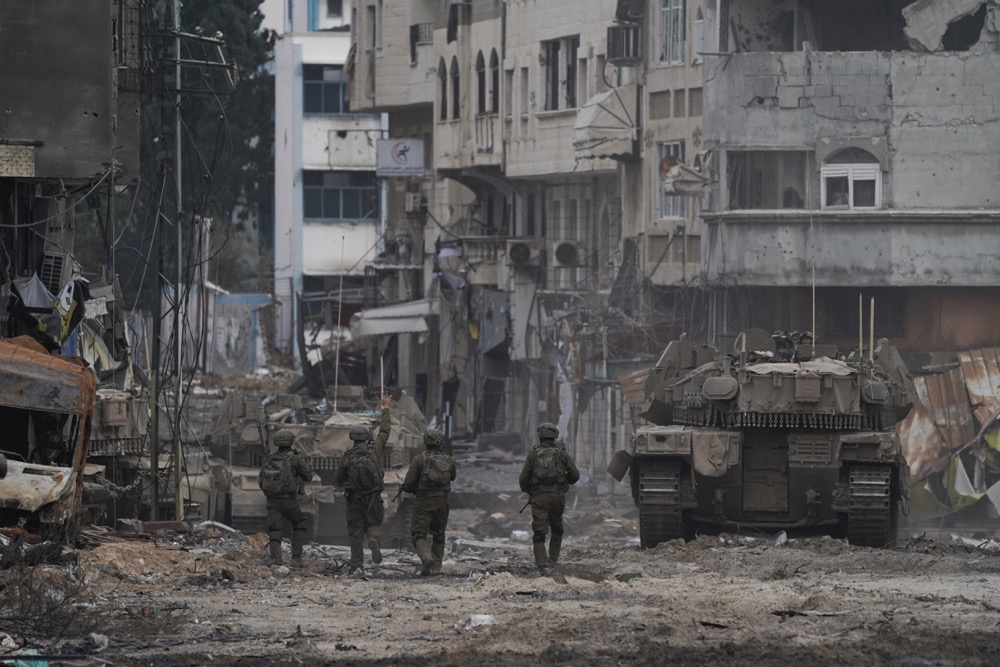
With 110 of the 240 hostages taken by Hamas returned, the Israeli military announced officially that the truce was broken. (AP)
Whereas the prevailing logic had been that the Middle East conflict could at best be “managed,” the past 54 days had “thoroughly dispelled that notion,” with governments in Washington, Paris and London, as well as Tel Aviv and Ramallah conscious now that it needed to end.
“Because of this recognition, I have been left slightly more confident we’ll see a resumption of work toward the two-state process,” Borck said.
“Look at the comments from Kier Starmer (UK opposition leader and odds-on favorite to win the next election) when he said Europe and the UK had given up on seeking peace in the Middle East because they felt it was too intractable.
“You sense, were he to become prime minister, this may lead to a change but, of course, he’s not as important as the person in the White House.”
Asked what he thought the agenda would be for the US when this war ends, Borck said that if Donald Trump returned, “all bets were off,” but were Biden to remain, he expected a greater focus on seeking peace, bringing the biggest win to Gaza’s embattled population.



